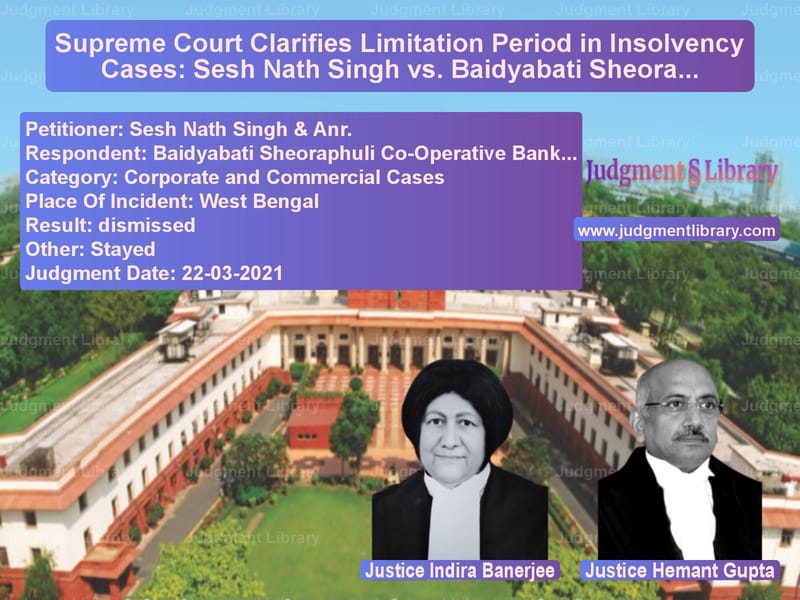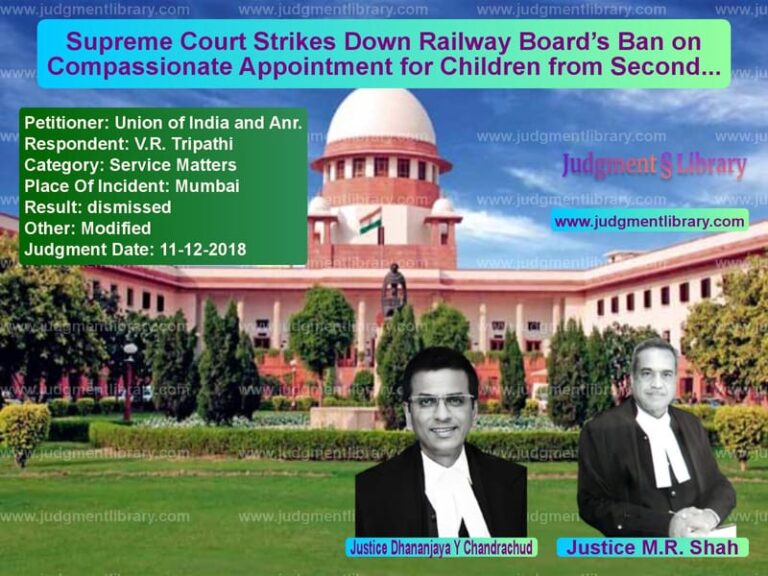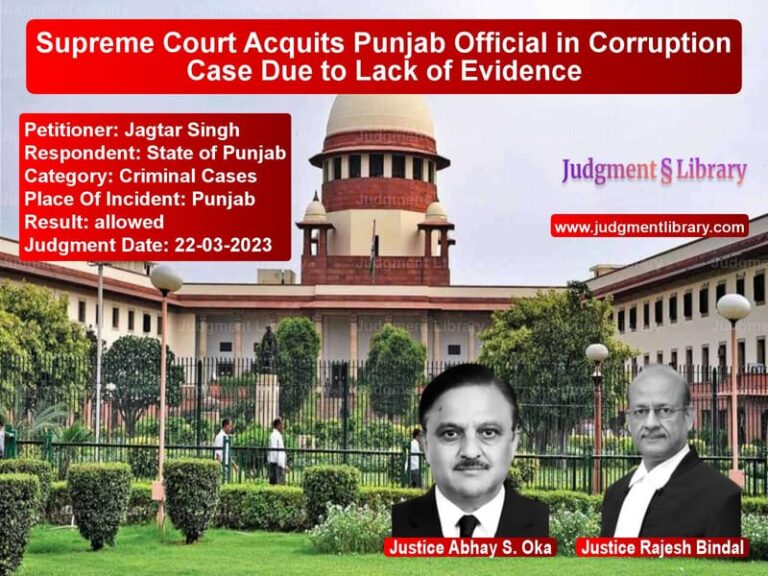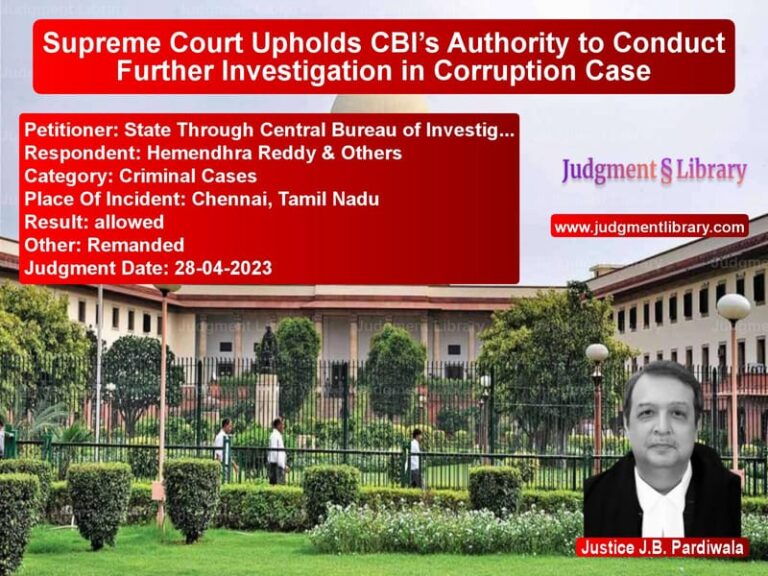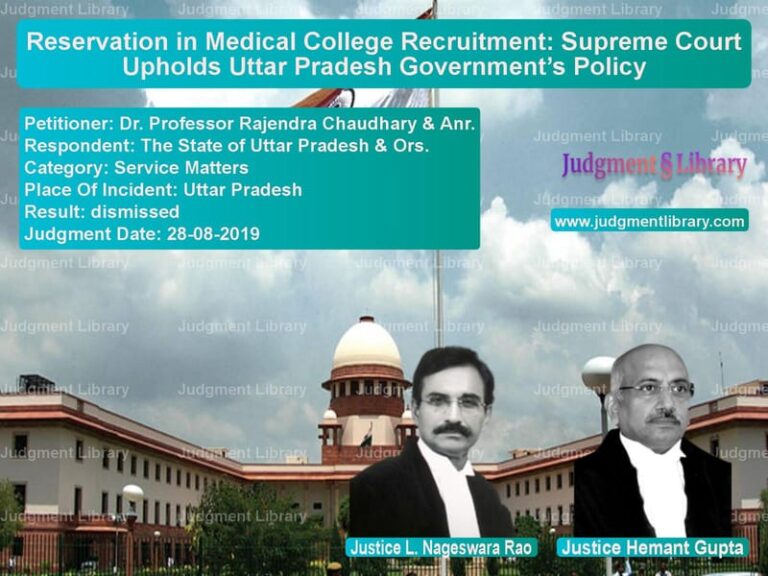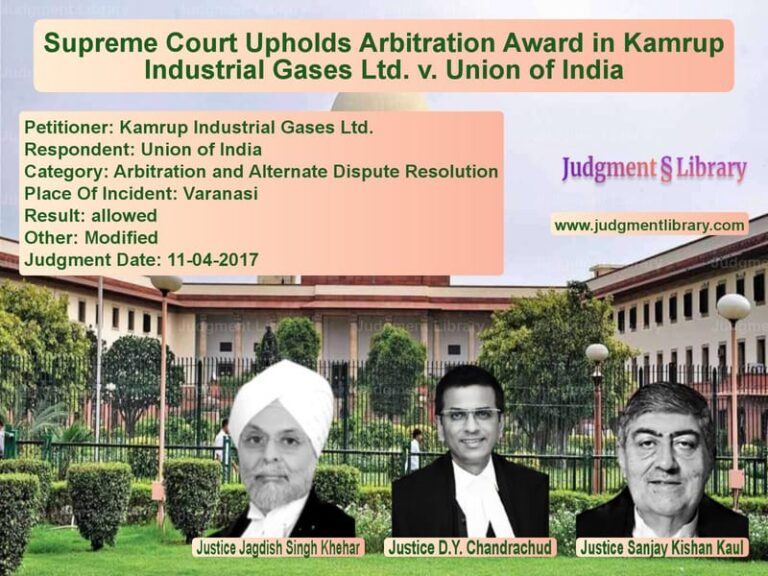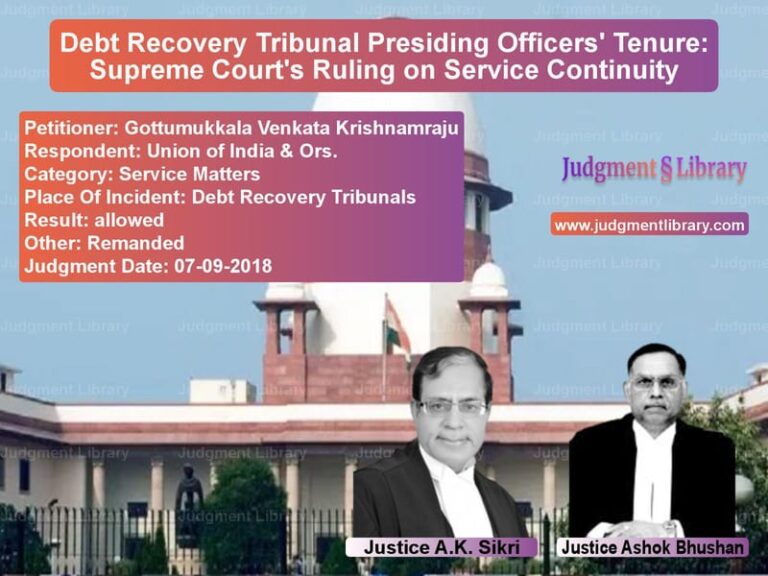Supreme Court Clarifies Limitation Period in Insolvency Cases: Sesh Nath Singh vs. Baidyabati Sheoraphuli Co-Operative Bank
The Supreme Court of India delivered a crucial judgment in the case of Sesh Nath Singh & Anr. vs. Baidyabati Sheoraphuli Co-Operative Bank Ltd. & Anr. on March 22, 2021. The ruling addressed the issue of limitation in insolvency proceedings and clarified the applicability of Section 14 of the Limitation Act to proceedings under the Insolvency and Bankruptcy Code, 2016 (IBC).
Background of the Case
The dispute arose when the Baidyabati Sheoraphuli Co-Operative Bank filed an application under Section 7 of the IBC before the National Company Law Tribunal (NCLT), Kolkata Bench, seeking to initiate Corporate Insolvency Resolution Process (CIRP) against Debi Fabtech Pvt. Ltd., the corporate debtor. The company had defaulted on a cash credit facility of Rs. 1 crore granted by the bank in 2012. The account was declared a Non-Performing Asset (NPA) on March 31, 2013.
Subsequently, the bank initiated proceedings under the Securitization and Reconstruction of Financial Assets and Enforcement of Security Interest (SARFAESI) Act in January 2014. The corporate debtor challenged the SARFAESI proceedings by filing a writ petition in the Calcutta High Court, which resulted in an interim stay in 2017. In July 2018, while the SARFAESI proceedings were still pending, the bank filed an application under Section 7 of the IBC.
Arguments of the Petitioner
- The petitioners argued that the application under Section 7 of the IBC was time-barred since it was filed after more than five years from the date when the account was declared NPA.
- They contended that proceedings under the SARFAESI Act do not qualify for exclusion of time under Section 14 of the Limitation Act because those are not proceedings before a civil court.
- They relied on the NCLAT’s judgment in Ishrat Ali v. Cosmos Co-operative Bank Ltd., which held that proceedings under SARFAESI cannot be counted for the purpose of excluding limitation under Section 14.
- The petitioners maintained that the NCLT had no authority to condone delay beyond three years when no application for condonation was filed under Section 5 of the Limitation Act.
Arguments of the Respondents
- The bank argued that the limitation period should be counted after excluding the time spent in pursuing the SARFAESI proceedings.
- They contended that the delay in filing the IBC application was due to bona fide proceedings under SARFAESI, which were later stayed by the High Court.
- The respondents further emphasized that the IBC allows for the exclusion of time when proceedings are pursued in good faith before an incorrect forum.
Key Issues Before the Supreme Court
- Whether Section 14 of the Limitation Act applies to proceedings under Section 7 of the IBC?
- Whether proceedings under the SARFAESI Act qualify for exclusion of time under Section 14?
- Whether an IBC application can be admitted despite being filed beyond three years if there was a stay on earlier recovery proceedings?
Supreme Court’s Observations
The Supreme Court held that:
- The provisions of the Limitation Act apply to proceedings under the IBC as per Section 238A of the IBC.
- Section 14 of the Limitation Act, which allows for the exclusion of time spent in bona fide proceedings before an incorrect forum, applies to IBC cases.
- Proceedings under the SARFAESI Act are civil proceedings and qualify for exclusion under Section 14.
- Exclusion of time under Section 14 is not contingent on the earlier proceedings being formally terminated; an interim stay that prevents further action is sufficient.
- The bank had acted in good faith by first seeking relief under the SARFAESI Act before approaching the NCLT under the IBC.
Key Excerpts from the Judgment
“The insolvency resolution process under IBC is triggered by default. The Limitation Act applies as far as may be to proceedings before the NCLT and NCLAT. Proceedings under the SARFAESI Act qualify for exclusion of time under Section 14 of the Limitation Act as they are civil in nature.”
“If the period from the date of initiation of proceedings under the SARFAESI Act till the filing of the application under Section 7 of the IBC is excluded, the application is within the limitation period.”
Final Judgment
The Supreme Court dismissed the appeal and upheld the NCLT and NCLAT decisions. The ruling confirmed that the application under Section 7 of the IBC was not time-barred after excluding the period of the SARFAESI proceedings. The Court clarified that Section 14 of the Limitation Act applies to insolvency cases and that genuine delays due to pending legal proceedings can be considered for exclusion.
Implications of the Judgment
The ruling has significant implications for insolvency law in India:
- It establishes that time spent in SARFAESI proceedings can be excluded from the limitation period in IBC cases.
- It prevents the misuse of limitation rules to deny genuine insolvency claims.
- It ensures that financial creditors are not penalized for pursuing legitimate recovery proceedings before approaching the NCLT.
- It reinforces that IBC applications should be adjudicated in a manner that aligns with the broader goal of resolving insolvency efficiently.
By allowing the exclusion of time spent in SARFAESI proceedings, this judgment provides greater clarity on how limitation rules should be interpreted in insolvency matters, ensuring that procedural technicalities do not obstruct the resolution of genuine financial distress cases.
Petitioner Name: Sesh Nath Singh & Anr..Respondent Name: Baidyabati Sheoraphuli Co-Operative Bank Ltd. & Anr..Judgment By: Justice Indira Banerjee, Justice Hemant Gupta.Place Of Incident: West Bengal.Judgment Date: 22-03-2021.
Don’t miss out on the full details! Download the complete judgment in PDF format below and gain valuable insights instantly!
Download Judgment: sesh-nath-singh-&-an-vs-baidyabati-sheoraphu-supreme-court-of-india-judgment-dated-22-03-2021.pdf
Directly Download Judgment: Directly download this Judgment
See all petitions in Bankruptcy and Insolvency
See all petitions in Debt Recovery
See all petitions in Corporate Governance
See all petitions in Judgment by Indira Banerjee
See all petitions in Judgment by Hemant Gupta
See all petitions in dismissed
See all petitions in Stayed
See all petitions in supreme court of India judgments March 2021
See all petitions in 2021 judgments
See all posts in Corporate and Commercial Cases Category
See all allowed petitions in Corporate and Commercial Cases Category
See all Dismissed petitions in Corporate and Commercial Cases Category
See all partially allowed petitions in Corporate and Commercial Cases Category

